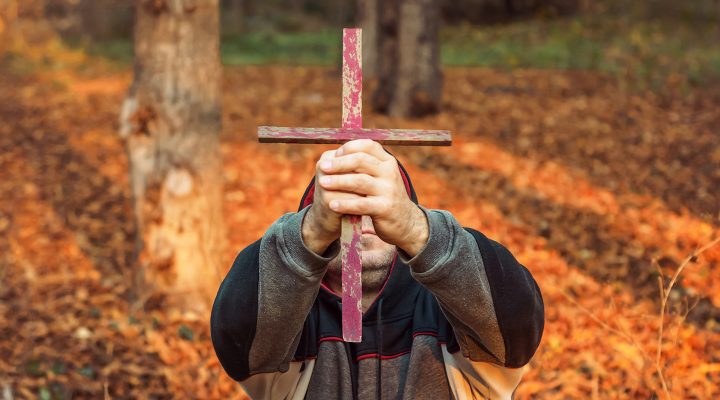“Concealment makes the soul a swamp. Confession is how you drain it.”
— Charles M. Blow
They have treated the wound of my people carelessly. They acted shamefully,
they committed abomination, yet they did not know how to blush.
— Jeremiah 6:14-15
As it is frequently proclaimed, particularly during Lent, you would think the church’s call to penitence, and its assurance of pardon, assumes that God — in classic passive-aggressive behavior — desires to offer grace but only if we submit to humiliation. A web search for images of “penance” reveals many photos of people beating themselves.
So let’s be clear about this from the beginning: God is not a sadist in need of compliant masochists.

Ken Sehested
Moreover, the community of faith needs to relearn the means of speaking this word in the public arena and not simply behind sanctuary doors and in Sunday school rooms.
Our recent national history is replete with apologies for the “mistakes were made” variety that deny responsibility, offering vague, scattershot “I apologize if I offended anyone” excuses for bad behavior or abusive speech. Such comments actually mean, “I’m sorry you took my (comment or behavior) the wrong way; I hope you get better,” putting the onus of recovery on the offended.
It’s easy to understand public disdain for any sort of penitential language. If absolution comes with no resolution — to live differently, in whatever small and incremental way — confession has been emptied of all meaning. And worse, it has become religious armor for infamy.
Mercy opens a portal to repentance, characterized not so much by apologetic expression as by the hard work of repairing the damage, of reestablishing trustworthy relations.
“If absolution comes with no resolution … confession has been emptied of all meaning.”
If we are to envision anything other than a dystopian future, we must recover language for what the Greek New Testament calls metanoia, “to turn around, to change one’s life,” usually translated as “repentance.”
To get there involves attention to seven precepts.
First, distinguish between shame and guilt. Insidiously, in our culture guilt is confused with shame, which is actually a form of self-preoccupation that engenders paralysis and passivity, an escape — knowingly or not — from response-ability. Shame removes agency, whereas the proper function of guilt is to identify transgression and mobilize the work of restoration.
Second, recognize such penance as a public and relational process, not just a private and solitary event. Spirituality always is personal but never merely private. While Jesus spoke in a more intimate tone concerning relations with the Abba than does much of Hebrew Scripture, his is a distinctive word, not a different one.
One of our greatest rhetorical needs is learning to announce the gospel word (which is always both a gift and a demand) in the public sphere and not just to isolated souls. Furthermore, the purpose is not to wallow in the prospect of loss, but to bask in the prospect of gain— not to dwell in the land of accusation, but to move forward to the land of shared bounty.
Third, comprehend the purpose of judgment as restoration, not retaliation. See it as the reclamation of virtue, not the authorization of vengeance. This framework has ancient antecedents in the Hebrew phrase tikkun olam (repair of the world) from the Jewish Talmud.
The new criminal justice paradigm known as “restorative justice,” as an alternative to the retributive justice model, also has insight for the church. Where the demand of retribution is “Who is to blame and how should they be punished?” the restorative principle asks, “Who has been harmed and who is responsible (and how) for repairing the injury?”
Fourth, acknowledging the process of restoration is often discomforting, frightening and strenuous. Often, what passes for reconciliation is the desire to “make nice,” to promote “civility” and suppress conflict prior to unearthing root causes of injustice. Peace is confused with order, when in fact the order is structured repression.
“Peace is confused with order, when in fact the order is structured repression.”
Truth-telling about suppressed history is essential. When accused of fomenting conflict, Dr. King rightly responded that he was simply bringing underlying conflict to the surface.
As has been said, when you’re accustomed to privilege, equality feels like oppression. Peace is not the absence of conflict but the presence of justice. Which is why peacemakers, who know that justice is at stake, are sometimes considered troublemakers.
Fifth, resolve no longer to be silent in the face of abuse. Among the many memorable lines from King’s bold and dangerous speech critiquing the Vietnam War is this: “A time comes when silence is betrayal.”
The #MeToo movement in recent years features courageous women coming forward, risking reputations and careers and even retaliation, calling to account the abusive sexual behavior of men. It represents a profoundly healing turn in our culture.
This turn also is stressful and disquieting. As has been said, “You shall know the truth, and the truth will make you odd; but first it will make you miserable.” The refusal to be silent in the face of bullying — of every sort — is the first step in flipping that script.
Sixth, ending silence in the face of abuse begins with the ritual work of lament, itself a form of penitence. This precept is among many things to be learned from African American communities of faith. The articulation of grief — whether in speech or music or dance or moaning — contains in its very performance the generative power of assurance that siphons away the power of fear.
Our capacity to grieve and lament are directly related to our capacity for hope, much like the circumference of a tree’s canopy is proportionate to its root system. Offering, welcoming, making space for grief plays an essential role in draining grievance of its poison. As Steve Garnaas-Holmes writes, “Sharpen the blades of your hope on the stone of grief.”
Seventh, the penitential life, which begins in disillusionment and grief, pushes toward clarity, which leads toward a kind of hope that is more than daydreaming. To hope for something is not a wouldn’t-it-be-nice sentiment. Hope hitches us to a process designed to overcome injustice by forging equitable relations.
“The past cannot be undone, and that the future cannot be controlled.”
This final precept is drawn from Rebecca Solnit’s amazing book Hope in the Dark: Untold Histories, Wild Possibilities, and it brings us back to where we began. Solnit writes, “Hope is not like a lottery ticket you can sit on the sofa and clutch, feeling lucky. Hope is an ax you break down doors with in the case of emergency. … The future is dark, with a darkness as much of the womb as of the grave.”
Conflict mediation specialist Byron Bland has written that two truths make healthy community difficult: That the past cannot be undone, and that the future cannot be controlled. However, two counterforces are available to address these: The practice of forgiveness, which has the power to change the logic of the past; and covenant-making, which creates islands of stability and reliability in a faithless, sometimes ruthless world.
The awareness that we have been culpable in harm is indeed painful, but the pain’s purpose is not punishment but a penitence that generates the resolve to engage the difficult work of reconciliation.
As King wrote in his anguished essay “Letter from Birmingham Jail,” “We are caught in an inescapable network of mutuality, tied in a single garment of destiny.”
These cords neither smother nor strangle. Such covenants are essential both for human and ecological flourishing. And this is what it means to be righteous in the eyes of God.
Ken Sehested is the author and editor of prayerandpolitiks.org, an online journal at the intersection of spiritual formation and prophetic action.


